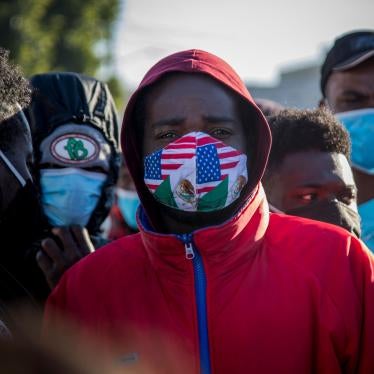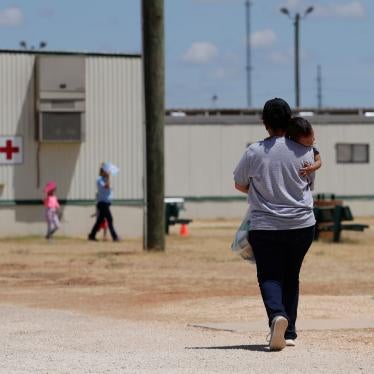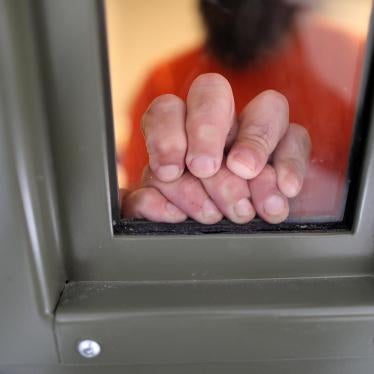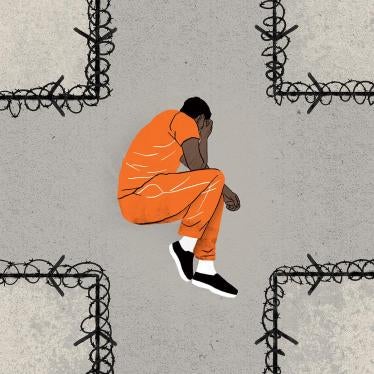Wendy Carrillo
California State Assemblymember
Capitol Office, Room 4167
P.O. Box 942849
Re: AB 937 (Carrillo) — The VISION Act — CO-SPONSOR
Dear Assemblymember Carrillo:
As a co-sponsor, Human Rights Watch writes in strong support of AB 937, the Voiding Inequality and Seeking Inclusion for Our Immigrant Neighbors (VISION) Act, which would prohibit people who have already been found eligible for release from local jails and state prisons from being transferred to immigration detention. The VISION Act would close the main pipeline by which California sends immigrants into a dangerous and abusive detention system. It would also provide immigrants who may be subject to deportation a stronger opportunity to assert their rights to a fair hearing and defend against deportation and family separation.
Human Rights Watch is non-profit, independent organization that investigates allegations of human rights violations in more than 100 countries around the world. For decades, we have documented the many ways in which the United States violates the basic rights of non-citizens in its country.
California is home to an estimated 11 million immigrants—about a quarter of the immigrant population nationwide. Almost one in three Californians is an immigrant; and one in two children in California has at least one immigrant parent. Community members California transfers to Immigration and Customs Enforcement (ICE) custody are refugees, lawful permanent residents, people who entered the United States as children, parents, caretakers, essential workers, or are otherwise valued California residents. In a 2017 report, Human Rights Watch estimated, based on ICE detention data, that more than 10,000 parents of US citizens are locked up in immigration detention in California each year.[1] By passing the VISION Act, California would be helping to limit the devastating impact of the detention and deportation system on its immigrants, their families, and their communities.
In particular, the VISION Act would:
- build on recent criminal legal system reforms by prohibiting local and state agencies from conducting immigration arrests and from assisting or facilitating immigration arrests, which includes prohibiting ICE transfers;
- prohibit California Department of Corrections and Rehabilitation (CDCR) parole agents and county probation officers from collaborating with ICE to funnel individuals who are on parole into immigration detention; and
- ensure that refugees and immigrants are treated equally by prohibiting state agencies, local agencies, and courts from using immigration status as a factor to deny or to recommend denial of placement in a diversion program, rehabilitation program, credit-earning program or class, or mental health program.
These are urgently needed reforms.
Human Rights Watch has documented severe injustices in the US criminal legal system. Hundreds of thousands of people are held in custody pre-trial merely because they cannot afford bail, forcing many who might have otherwise contested their charges to plead guilty.[2] Many face overly harsh sentences that do not accurately reflect the severity of their conduct, and laws and policies are routinely applied in an arbitrary and discriminatory manner, disproportionately impacting poor and minority communities.[3]
The US immigration system adds to the injustices of the criminal legal system by imposing the additional penalty of detention and deportation for a wide swath of offenses, including offenses that should not be criminalized, such as simple possession of drugs.[4] Immigrants are often not fully informed as to the possible immigration consequences of their guilty pleas. Even when criminal legal system reforms are enacted in efforts to address these severe injustices, US immigration law has remained inflexible. For example, Human Rights Watch has strongly supported changes to California’s youth offender parole process, which allows people imprisoned as young offenders to earn parole by providing strong evidence of rehabilitation.[5] However, immigrants who earn parole through this process have been immediately transferred to ICE detention and put into deportation proceedings, with no consideration of their rehabilitation, stable reentry plans, or community support. The US deportation system suffers from a well-documented lack of due process, as well as a failure to provide individualized hearings for all immigrants subject to deportation that take into full consideration length of residence, family and community ties, military service, and other important equities.[6]
Although the VISION Act would not change the harsh federal laws that allow many criminal convictions to trigger automatic detention and deportation, by stopping transfers to ICE detention, California would provide immigrants who have served their sentences and been deemed eligible for release a better opportunity to fight permanent family separation and exile. Detention is in many ways the crucial factor in an immigrant’s ability to fight deportation in immigration court – detained immigrants are the least likely to have legal representation, and legal representation is strongly linked to winning relief from deportation in immigration proceedings.[7]
By ending the transfer of immigrants to ICE detention, California would also significantly reduce the number of people who enter a dangerous and abusive system. Human Rights Watch has issued several reports based on independent medical experts’ analyses of deaths in immigration detention, which found a significant proportion occurred after people received severely subpar medical care, a problem that has only been exacerbated by the coronavirus pandemic.[8] Immigrants in detention are also subject to sexual abuse,[9] unsanitary conditions,[10] improper use of isolation,[11] and numerous everyday indignities, conditions that are incompatible with the concept of basic human dignity.
Human Rights Watch strongly supports the VISION Act because by ending transfers to ICE, California can make its criminal legal system reforms meaningful for all its residents, and can ensure that people released from prisons and jails are able to return to their homes and communities and fight any deportation case that might be filed against them in safety and with the support of their families. By passing the VISION Act, California can take a crucial step forward in fulfilling its commitment to justice for all its residents.
For these reasons, Human Rights Watch is proud to co-sponsor the VISION Act, AB 937, and urge your support. If you have any questions, please feel free to contact me at mengg@hrw.org or at (646) 363-6495.
Sincerely,
Grace Sung Ehn Meng
Associate Director, US Program
Human Rights Watch
[1] Human Rights Watch, “I Still Need You”: The Detention and Deportation of California Parents, May 2017, https://www.hrw.org/sites/default/files/report_pdf/uscaliforniaimmigration0517_web_0.pdf, p.2.
[2] Human Rights Watch, “Not in it for Justice”: How California’s Pretrial Detention and Bail System Unfairly Punishes Poor People, April 2017, https://www.hrw.org/sites/default/files/report_pdf/usbail0417_web_0.pdf, p. 42.
[3] Human Rights Watch, Submission to the United Nations Human Rights Council’s Universal Periodic Review of the United States of America, October 3, 2019, https://www.hrw.org/news/2019/10/03/human-rights-watch-submission-united-nations-human-rights-councils-universal.
[4] Human Rights Watch and the American Civil Liberties Union, Every 25 Seconds: The Human Toll of Criminalizing Drug Use in the United States, October 2016, https://www.hrw.org/report/2016/10/12/every-25-seconds/human-toll-criminalizing-drug-use-united-states.
[5] “California: New Hope for Young Offenders,” Human Rights Watch news release, October 5, 2015, https://www.hrw.org/news/2015/10/05/california-new-hope-young-offenders.
[6] “US: 20 Years of Immigrant Abuses,” Human Rights Watch news release, April 25, 2016, https://www.hrw.org/news/2016/04/25/us-20-years-immigrant-abuses; Human Rights Watch, Forced Apart: Families Separated and Immigrants Harmed by United States Deportation Policy (2007), https://www.hrw.org/report/2007/07/16/forced-apart/families-separated-and-immigrants-harmed-united-states-deportation.
[7] Ingrid Eagly and Steven Shafer, American Immigration Council, Access to Counsel in Immigration Court, September 2016, https://www.americanimmigrationcouncil.org/research/access-counsel-immigration-court, p. 2.
[8] Human Rights Watch Amicus Letter in Support of a Petition for Writ of Mandate, “California Should Halt Transfers to ICE Custody During the Covid-19 Pandemic,” May 1, 2020, https://www.hrw.org/news/2020/05/01/human-rights-watch-amicus-letter-support-petition-writ-mandate; citing Human Rights Watch, Code Red: The Fatal Consequences of Dangerously Substandard Medical Care in Immigration Detention, June 2018, https://www.hrw.org/report/2018/06/20/code-red/fatal-consequences-dangerously-substandard-medical-care-immigration; Human Rights Watch, Systemic Indifference: Dangerous & Substandard Medical Care in US Immigration Detention, May 2017, https://www.hrw.org/report/2017/05/08/systemic-indifference/dangerous-substandard-medical-care-us-immigration-detention.
[9] Human Rights Watch, “Do You See How Much I’m Suffering Here?”: Abuse against Transgender Women in US Immigration Detention (New York: Human Rights Watch, 2016), https://www.hrw.org/report/2016/03/24/do-you-see-how-much-im-suffering-here/abuse-against-transgender-women-us.
[10] American Civil Liberties Union, Human Rights Watch, and the National Immigrant Justice Center, Justice-Free Zones: U.S. Immigration Detention Under the Trump Administration, April 2017, https://www.hrw.org/sites/default/files/supporting_resources/justice_free_zones_immigrant_detention.pdf, p. 4.
[11] “Attorney General Becerra Releases Second Report on Immigration Detention Facilities in California,” Office of the Attorney General press release, January 19, 2021, https://oag.ca.gov/news/press-releases/attorney-general-becerra-releases-second-report-immigration-detention-facilities (accessed March 25, 2021).








